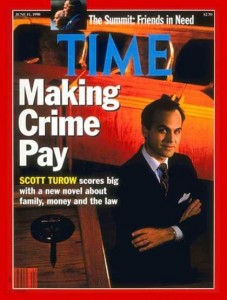 Libraries. The Internet. Pirate sites.
Libraries. The Internet. Pirate sites.
According to author Scott Turow’s recent op-ed piece for the New York Times, these things are all to blame for the “Slow Death of the American Author.”
Best-selling novelist and Author’s Guild president Scott Turow discusses how all of these entities are creating an environment where authors will make less money, and entities such as Amazon will get to pocket it all.
“But it is the latest example of how the global electronic marketplace is rapidly depleting authors’ income streams. It seems almost every player—publishers, search engines, libraries, pirates and even some scholars—is vying for position at authors’ expense.”
That was Turow’s response to the Supreme Court’s decision that the importation and resale of foreign editions of American works is legal. But his argument is so much more than that. Let’s list the ways:
• Copyrights are being depreciated
• Publishers limit e-book royalties to 25 percent
• Pirate e-book sites
• Libraries lending e-books
There are actually more reasons than that, and I suggest reading the op-ed piece in order to truly wrap your head around it. However, Turow sums up his piece in the third-to-last paragraph:
“Many people would say such changes are simply in the nature of markets, and see no problem if authors are left to write purely for the love of the game. But what sort of society would that be?”
That’s a rather simplistic view on Turow’s part. Change is going to happen.
As someone who has spent the last 15 years in the newspaper industry, I watched the change every day—from the beginning of the news world on the Internet, to it becoming one of the leading ways consumers get their news, and often free.
Companies that haven’t changed with the marketplace have felt the unfortunate effects with closed businesses, newspapers cutting back print and the never-ending layoffs. But there are companies finding ways to survive and then thrive in the newspaper world by changing and adapting to become profitable outside of the traditional advertising model.
That’s not the answer to Turow’s plight, but it shows that those unwilling to change will be left behind and will eventually disappear.
Publishing companies need to adapt as well, and authors need to find the companies that accept what is happening now—or they can self-publish.
This transition is not going to be easy, as witnessed in the newspaper industry. Sometimes it’s going to take companies to take chances that end up failing.
But moaning and whining, of course, never solved anything.
































What sort of a society would it be? Pretty much the one we have now. Take away the artificial distortion of language that makes ‘author’ equivalent to ‘author issued by major publisher’, and we can see the reality, which is that most authors make little or nothing from their writing. What the Great Levelling will do, hopefully, is to remove most or all of the barriers that keep writing from being discovered by the people who want to read it, whether somebody went through agonies to ‘publish’ it or not. If readers move away from best-selling authors because they’ve found something more to their tastes, that’s a positive for society, isn’t it?